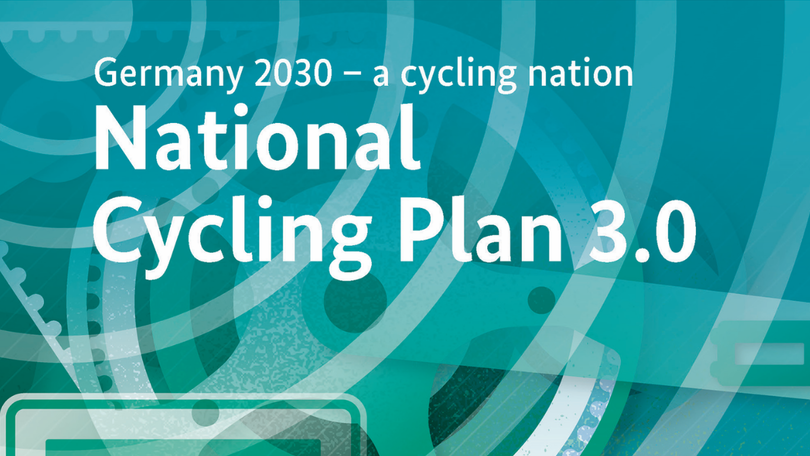
Source: Federal Ministry for Digital and Transport
The National Cycling Plan (NCP) 3.0 is the Federal Government’s global strategy to promote cycling in Germany for the time until 2030. The overarching goal of the NCP 3.0 is to make cycling in Germany more attractive and safer and significantly increase the number of kilometres travelled by bicycle. It defines four pillars of cycling promotion: ‘Politics’, ‘Infrastructure’, ‘People’ and ‘Business’ as well as two cross-cutting areas: ‘Digitalization’ and ‘Cities and Rural Areas’. On this basis, the NCP 3.0 specifies various qualitative and quantitative key objectives and gives extensive recommendations for action for the Federal Government, federal states, local authorities, associations and industry.
In order to achieve the goals of the NCP 3.0, the Federal Ministry for Digital and Transport is comprehensively promoting cycling with various support and funding programmes, which are aimed at different needs for action.
The NCP 3.0 – A vision for more, better and safer cycling
The NCP 3.0 outlines the vision of ‘Germany 2030 – a cycling nation’
“In 2030, cycling will be a matter of course and diverse. People will enjoy cycling and feel safe doing so. In short, cycling will be attractive to everyone, a way of life and an opportunity to experience and engage with the world in a new way. The bicycle will be the means of transport of choice on more and more routes, both in everyday life and for leisure.
More, better and safer cycling throughout Germany is an issue that concerns everyone, the Federal Government, federal states and local authorities, the people of Germany as well as companies and service providers. The only way that we will be able to implement the measures and suggestions for the design of sustainable mobility laid down in this cycling strategy is through joint effort and continuous exchange. Exchange and communication promote good ideas and ensure a fair balance of interests. With seamless cycling networks and high-quality infrastructure, people in Germany will have a better quality of life, both in rural areas and in smaller or larger cities alike. They will be able to get around quickly and safely by bike. German’s bicycle industry will profit from products that are in demand in Germany, Europe and also worldwide.
Cycle tourism in Germany will become very popular, both nationally and internationally. Quality of life and people’s health will be enhanced thanks to increased physical activity through cycling.” (Source: NCP 3.0, p.8)

Source: Fotolia / zozzzzo
Joint effort to achieve the objectives
In order to increase the use of bicycles, many individual measures need to be taken by all those responsible at Federal Government, federal state and local levels, as well as by associations and businesses. All of them will have to make a team effort to encourage more people in Germany to switch to cycling in the future. A key prerequisite for getting people on their bikes is a good cycling infrastructure which makes cycling both convenient and safe.
With the NCP, the Federal Government has taken over an active role as a facilitator, coordinator and catalyst in order to promote cycling nationwide. In addition, the Federal Government is financing the construction of cycle paths along federal highways. Germany is a federal country with a clear division of tasks, and it is primarily the federal states and local authorities that are responsible for cycling infrastructure and the promotion of cycling in local communities. Thus, although the NCP is a plan of the Federal Government, the recommendations it contains are addressed to the federal states and local authorities, in particular.